
The races of Elves and Men have long shared friendship in the northwest of Middle-earth. The two kindreds first came into contact long ago, in the First Age of the world, when the Edain, the Fathers of Men, came over the Blue Mountains and down into Beleriand. Finrod, the Elven king of Nargothrond, first of all the Noldor encountered Men. Coming upon a band of them encamped for the night and asleep, he stole among them and, taking up a harp, began to play with elvish skill. The men awoke, and hearing Finrod’s beautiful music, thought they lingered in some fair dream. Finrod remained with the men for some time, befriending them, learning their language and teaching them the tongue of the Grey Elves. In all the long years since, the Elves and the faithful descendants of the Edain have had friendship, and their fates are intertwined.
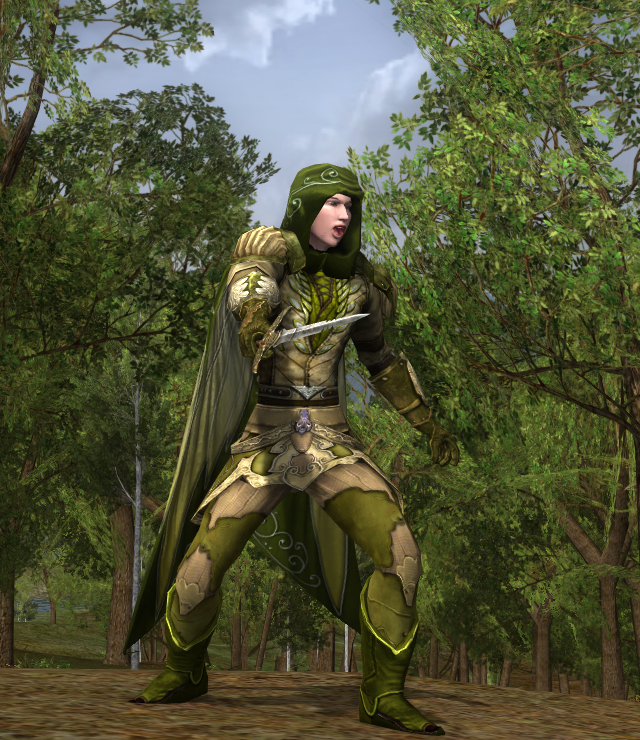
In the Third Age, though the time of the Elves is fading, there remain some among the fair folk who have a special fondness for mortal Men, particularly the Dúnedain of the North, who are the descendants of the Edain of old. This elf is one of these Friends of Man, who feels that it is the duty, indeed the fate, of the Elves, the elder of the two kindreds, to offer guidance and support to Men, the younger, for the dominion of Men over Middle-earth shall soon come, even as the Elves fade. Therefore, he travels far and wide throughout Eriador, sometimes alone, sometimes among one of the Wandering Companies, meeting his mortal friends, for the most part Rangers, at hidden places in the wild, often the sites of ruins dating back to the Elder Days. Together they share tidings, songs and tales, and the goodwill of their kindreds. Our elf is comfortably clad for travel, in a jacket and leggings of rusty green and fawn-brown, and wears a hooded cloak of many hues of green. He carries a harp which he plays while encamped with his companions beneath the stars, just as Finrod played for the Edain long ago. His vambraces, pauldrons, and jacket are of Mannish make, treasured gifts from his Ranger friends, some now long dead, maybe, for the lives of Men are fleeting to the Elves.

I was inspired by two things putting this outfit together. For one, I wanted to finally use the Cloak of the Fifth Season in an outfit. I haven’t used it so far because find it to be a challenging piece, since it’s undyeable and has a strange default colour that incorporates several different shades of green. (Complete digression, but I was sorry to see that there is no Cloak of the Sixth Season on offer at the in-game anniversary celebration this year.) The other inspiration was the in-game Elvish racial trait “Friend of Man”, which mitigates the penalty Elves take to the Fate statistic. In contrast, Men in LOTRO take a reduction to Will and have a bonus to Fate. When I first started playing LOTRO I remember thinking this was all a bit weird (I still do), since the interplay of fate and free will is such an important and prominent theme in Tolkien; and it is Elves who are heavily governed by fate while Men are notable for their free will. In The Silmarillion Ilúvatar decrees that
‘[…]the Quendi [Elves] shall be the fairest of all living creatures, and they shall conceive and bring forth more beauty than all my Children; and they shall have the greater bliss in this world. But to the Atani [Men] I will give a new gift.’ Therefore he willed that the hearts of Men should seek beyond the world and find no rest therein; but they should have a virtue to shape their life, amid the powers and chances of the world, beyond the Music of the Ainur, which is as fate to all things else[…]
— Of the Beginning of Days, The Silmarillion
I’ve had the privilege and pleasure to audit several courses taught by esteemed Tolkien scholar Verlyn Flieger, who reads this passage as an indication that Elves do not possess free will. Thus, she says, Tolkien uses the separate races of Elves and Men in his fiction to contrast one people governed by fate and another with the ability to exercise free will. However, I think a slightly different interpretation is possible. I suggest that all the beings created by Ilúvatar do in fact have free will, but only in the Race of Men can the results of actions taken by free will change the fate laid out in the Music, as suggested in the passage quoted above. Elves can and do exercise free will, but the consequences of their actions are strictly internal; only the acting elf’s motivation is affected, not the course of events that follow. For example, we see this demonstrated when, after the Two Trees of Valinor are destroyed, Yavanna asks the elf-artisan Fëanor to break the Silmarils, the great jewels he had made, so that she might restore the Trees. But loving too well the work of his own hands Fëanor refuses, not knowing that the Silmarils have already been seized by Morgoth. Had Fëanor agreed to Yavanna’s request, his motivation, his inner character, would have been entirely different, yet all of the events that followed would not be changed, only their context, for the Silmarils were for ever beyond his reach. Thus, my interpretation is that Tolkien is using Elves and Men to illuminate the ways in which free will can sometimes appear to affect fate, yet at other times have no effect upon it, and to explore and reconcile the paradox of a world (our world) in which fate and free will can appear to coexist.
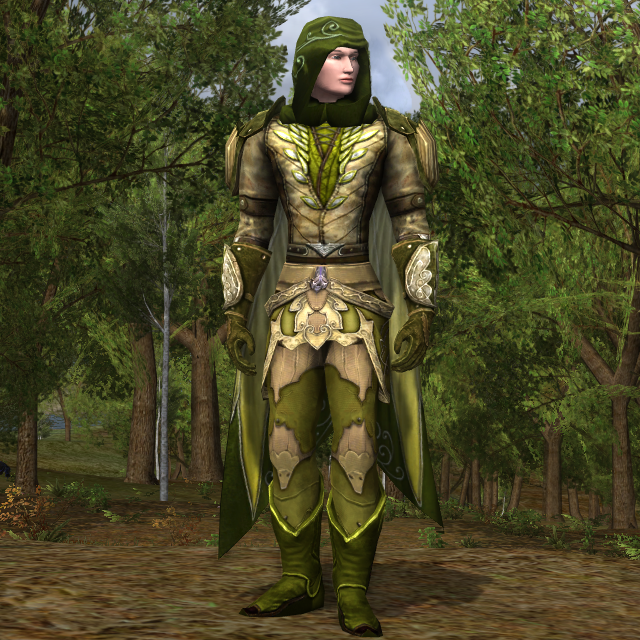
- Shoulders: Westernesse Protector’s Shoulder Guards (crafted — tailor T5; or looted — world drop/general), olive
- Back: Cloak of the Fifth Season (bartered — anniversary event games-master/cosmetics), default
- Chest: Lesser Voice of the West Robe (bartered — Harndirion novices quartermaster/tier 1 difficulty Minstrel’s armour), yellow
- Hands: Gloves of the Heartmender (bartered — Tinnudir Wardens of Annúminas reputation quartermaster/Minstrel’s goods), olive
- Legs: Elven Traveller’s Leggings (crafted — tailor T3; or looted — world drop/general; or purchased — Rivendell light armour vendor), Ranger green
- Feet: Boots of the Shadow-walker (bartered — skirmish camp classics quartermaster/Barad Guldur – level 65 medium), yellow
Tips: If you don’t have access to the Gloves of the Heartmender, there are a number of world drop Westernesse-style medium armour gloves that would make a great alternative. You could also use the Barrow-scout’s Gauntlets (bartered — skirmish camp classics quartermaster/Great Barrow – armour set). Don’t forget that you can pick up the Cloak of the Fifth Season from the Games-master vendors in Bree, Michel Delving, Thorin’s Hall, and Celondim while the anniversary event is running until 6 May this year.
You may also like:



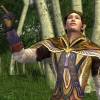



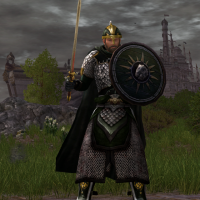
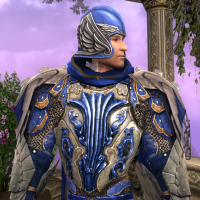
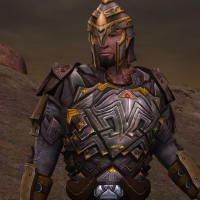

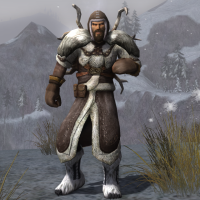
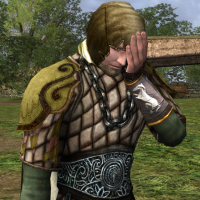
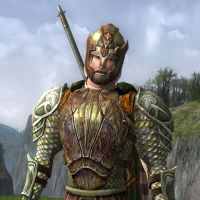
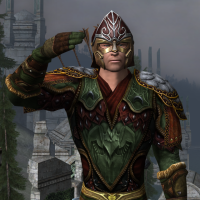
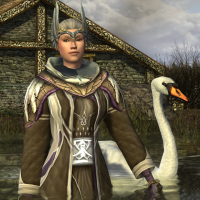
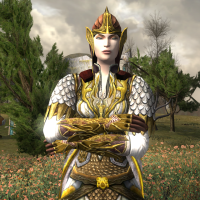
I could never find a good outfit for that cloak, but yours is really nice 🙂 what i liked the most about this post however is the lore explanation, we know that from the days of old there have been Friends of Elves, such as Beren, Aragorn etc. but hey, there sure must have been also elves who develolped great friendship with men even if their names remain in shadow, as you wrote Finrod had done, they are children of eru and care for each other, excellent post Starry 😉
Aw, thank you so much Gloredh, glad you liked it! As I was writing this I realised I could probably go on at length about this topic but I had to keep it to a reasonable length and the “friend to Man” stuff kind of took a backseat to the fate/free will stuff — glad it was still a worthy post! 🙂
Finally, an outfit to match that cloak! 🙂
I’m really intrigued by the idea of fate vs free will in Middle Earth…I always interpreted the in-game Will / Fate bonuses / reductions as follows: the elves’ fate is “reduced” because their time in the world is drawing to a close–their story is, in effect, ending (and as they will no longer take part in the events of Middle Earth, there is no more ‘fate’ for them to reach). I also didn’t think (in the game) to interpret will as “free will” so much as “willPOWER” (ie, men have a will reduction because men are weaker of will than the Eldar). Interesting to explore, anyway!
Oh yes, I agree with you that that’s how Turbine meant the Will and Fate stats to be interpreted. I was just being a teensy bit disingenuous as an excuse to talk about fate vs. free will, haha! 😉 Fate vs. free will is one of my favourite themes in Tolkien and I could go on about it all day long. Thank you for your thoughtful comment as always Cennwyn! 🙂
An interesting read, as always! I’ve not heard of Flieger before, so I shall have to check her out.
One thing I feel was missed in a big way by Turbine was the roving companies of Elves and Dwarves. For one, they’re just cool, especially the Elvish companies like Gildor’s, and from a gameplay perspective they could add a bit of dynamism to an otherwise static world. Oh well.
Thank you Shipwreck! Flieger is fantastic, really insightful, a great teacher and just a really nice lady. If you’d like to read some of her stuff, I’d recommend Splintered Light, it’s wonderful.
I sort of got a Wandering Companies vibe from that old Great-Barrow-related quest, “Heading West” (I think that was the title). But that was before the Bree-land revamp(s), when the small group of Elves used to hang out near Adso’s camp. I think they might have been moved somewhere else nowadays. But I know you’re talking about mobile companies travelling about, which I agree would be really cool if handled properly. Who knows, maybe during some zone revamp someday… 🙂
I don’t understand how anyone who has read the Silmarillion could entertain the possibility even for a moment that Elves have no Free Will. That simply makes no sense at all in light of the text. Second, to discuss fate and free will in Middle-earth you really have to be clear about what those terms mean. I typically find that what most people mean by “fate” has no real relation to how Tolkien uses the idea of fate in his stories.
Thanks for commenting, Fionnuala, it’s always nice to hear from you. 🙂 I agree with what you’ve said in your second point, but I’m not sure if you’re reacting to my interpretation or to the interpretation I ascribed to Dr. Flieger. If the latter, I hasten to assure you that I have grossly oversimplified her position!
As to your first point, some of the other students in Dr. Flieger’s class that I audited were also quite frustrated by and opposed to the idea of Elves without free will. Like you, they (and I) prefer to interpret the Elves as definitely having free will, but I do see Dr. Flieger’s point. To play Devil’s advocate to my own interpretation and support Dr. Flieger’s, in the example of Fëanor, the Trees, and the Silmarils, Fëanor makes a choice, or at least appears to make a choice. But does he really, since it doesn’t matter? The Silmarils are already stolen, the Trees cannot be restored. Does a person really have free will if their choices cannot affect the external world? I think that’s the starting point to a serious consideration of Elves as beings with no free will.
As I said in the post, my particular interpretation is that the Elves do have free will, but it only affects their inner motivation and reveals or alters their own character. This is what makes the free will of the Elves different from the specially-gifted and specially-empowered free will of Men (otherwise, why draw a distinction between the two races with regard to their relationship to fate?). The line between the two interpretations is pretty fine and maybe even just a matter of semantics, I suppose. But I think the Fëanor example and many others (Túrin’s whole story, Gollum’s part to play in that “he must do as he will“, Aragorn’s “now may I make a right choice, and change the evil fate of this unhappy day”, etc.) are calculated on Tolkien’s part to encourage us to ask exactly these questions, to draw attention to the apparent paradox of free will and fate existing in the same world, and to offer a possible reconciliation of that paradox. The reconciliation that I am thinking of here is that free will is free will whether it can affect the external world or the internal world, or both, and because it is not always one way or the other, or always both, we perceive a conflict (if you believe at all in predestination).
It is definitely a complex thematic element that invites a lot of contemplation, deliberately so on Tolkien’s part, I think. I apologise if I misrepresented Dr. Flieger’s position by oversimplifying it. Hopefully I’m making the point here that I think there is absolutely no lack of understanding or insight on her part. If you haven’t read any of Dr. Flieger’s books, may I recommend Splintered Light as I did to Shipwreck (link below his comment). I think you’d find it very delightful.
If I’ve totally misinterpreted you and your comment was a criticism of my interpretation, please let me know so I can better consider your points! 🙂
Having given the matter some additional thought and reading this elaboration on your initial statements, I wonder how this might play into the idea of elves like Galadriel supporting the plan to destroy the ring. There isn’t really another moral choice (in my opinion), but the elves all could have said, “No, we don’t to destroy the ring because it will mean the end of everything we’ve built for.” And of course, I assume Frodo would have done it anyway–so, according to the particular understanding of free will you present here, the elves either come out of it looking like they’ve made a noble sacrifice or looking like massive jerks.
I also wonder how this applies to the story of Turin, who certainly does have free will but was (seemingly) unable to escape the curse of Morgoth and change his fate.
Or how this applies to Aragorn; who made the choice to pursue Arwen, and thus changed HER fate. By this definition of free will, had *Aragorn* chosen differently, could he have affected her fate? I suppose what I’m asking is: if men have free will and elves don’t, and men have the power to affect change in a way that elves do not, can men change the fate of the elves?
Oh dear. I’m afraid I could talk about this all day as well 🙂
Really interesting issues to consider, thanks for chiming in Cennwyn! 🙂
I really like how you framed your first idea and I completely agree with your line of thought. I also think you’re onto something with the question of Men’s free will altering the fate of Elves. For my part, I think it can, and I think there are some examples of this in the Túrin story and also the Beren and Lúthien story. Unfortunately I’m at work so I can’t check my books for examples but I feel quite confident there are some passages pointing to this. I also think your example of Aragorn affecting Arwen’s fate is a really good one.
Your ideas made me consider the scene where Frodo offers the Ring to Galadriel. Since, as a Hobbit, Frodo is technically a Man, his free will has the ability to “go beyond the Music”, and I think we see in that scene that although it is Galadriel being tested, the focus is primarily on the will of Frodo. “I will give you the Ring,” he says. Galadriel makes her first speech about the evil of Sauron’s design and then goes into her more famous but often misquoted speech. “And now at last it comes. You will give me the Ring freely!” I do not think there words will and freely are in that sentence without thematic intent. Frodo’s act of will could have changed Galadriel’s fate, and I think we might be able to read this as having granted her the ability to make a choice changing things externally, had she accepted the Ring. Her decision is to keep the consequences of her choice internal. To my mind, that makes her passing of the test all the more impressive and noble.
As for the story of Túrin, I feel that the entire story is designed to keep us wondering which events of the story are the result of fate and which are the result of free will — and we never get a really clear answer so it’s up to us to decide for ourselves.
This is a great discussion — I’d love to hear thoughts from others. If anyone has anything to add please feel free to chime in! 🙂
Regarding Frodo…I had never considered this until I read an excerpt from one of Tolkien’s letters, but when he finally makes it to Mount Doom, he says: “I have come […] but I do not choose now to do what I came to do.” I assumed the ring overcame him and thought no more about it, but this letter (too long to copy here) got me to thinking about it: the gist was that Frodo knew he was “wholly inadequate to the task. His real contract was only to do what he could, to try to find a way, and to go as far on the road as his strength of mind and body allowed.” I think there’s a lot of subtext, here, regarding not only fate and free will, but…and I’m finding this hard to phrase, but…by taking on a task which Frodo knows he’s likely to fail at achieving, he is in a way surrendering his will in this matter (to what, I cannot say–but he is certainly trusting in something beyond himself, I think).
Agreed, and I think it calls back to the moment at the Council of Elrond when Frodo announces that he will take the Ring, but feels as though an external will is speaking through him.
Starry, I’m not even sure if I should comment more on this because I feel like I would need to write a very long essay to due this subject justice. I’m just obsessed enough with Elves to do it at the slightest provocation, but I really don’t have the time. 😉 What I will say is that I feel that the difference between the Free Will of Elves and the Free Will of Men has to do with the fact that Men are a fallen race while Elves seemingly do not suffer from concupiscence (meaning desires of the lower appetite which are contrary to reason).
Thanks for elaborating, Fionnuala, very fascinating. I’m presuming that you’re using concupiscence in a Catholic rather than Protestant sense. To talk myself through this so I can understand more clearly, I’m going to try to think in terms of Thomism in Tolkien, but I’m woefully ignorant of the subject so please correct me (someone, anyone) if I’m way off base about anything.
If I’m reading you correctly, you’re contrasting the essential natures of Elves and Men based on the Thomistic doctrine of states of nature as summarised by Garrigou-Lagrange, and advancing the idea that the nature of Elves frees them from concupiscence entirely, whereas the nature of Men does not. But do you mean that Elves do not suffer from concupiscence because of their essential nature as created by Ilúvatar and thus have no need to exercise free will to overcome concupiscence, unlike Men; or do you mean that it is a property of the free will possessed by the Elves that it allows them to be free them from concupiscence, unlike Men? I can’t tell from your comment, but let me see where I might go with this…
Thinking Thomistically, Men are in either a state of pure nature (which in the Primary World must be considered a theoretical state since Man was created in a state of grace) or in a state of fallen nature (although in the Secondary World the offstage Fall of Man took place after the bestowal of the Gift/Doom of Men). I’m also thinking about both the Athrabeth and the Tale of Adanel and some of the seeming contradictions or changes in Tolkien’s own ideas from the earlier writings. I like the uncertainty or tension created by those two pieces, when considered side-by-side, about the state of Man’s nature — pure or fallen in the Thomistic sense.
Meanwhile, Elves (or at least the Vanyar, those of Teleri who came to Aman, and those of Noldor who remained there) are in a state of integral nature, free from suffering, death, and concupiscence. This makes sense in light of Tolkien’s comments about Elves being an image of Unfallen Man. Doesn’t the idea of Elves in a state of integral nature cause some problems, though? Couldn’t Fëanor’s jealousy of the Silmarils be considered concupiscence? Couldn’t Galadriel’s desire to rule a realm of her own? And what about Maeglin’s “strange and crooked” desire for his cousin Idril? Men are certainly a fallen race in Tolkien, but some Elves, the Noldor, specifically, do experience a Fall complete with an Exile. Indeed, as you know, Maglor made a song about it, Noldolantë — “The Fall of the Noldor”. But if all Men and some Elves are fallen, and some Elves apparently do suffer from concupiscence, how does this help us understand the difference between the free will possessed by Elves as opposed to that possessed by Men in light of the Gift of Ilúvatar and “the Music, which is as fate to all things else”? It seems to me that the issues of concupiscence and the Thomistic natures of Men and Elves are separate to the issue of the interaction of fate and free will as a theme.
If these are indeed two separate issues, is there room for the idea to coexist that Elvish free will can only have internal consequence? I feel that there is. It seems to me, now that you have brought it to my attention, that the idea of Thomistic states of nature is certainly explored by Tolkien through the inclusion of the separate races of Elves and Men, but I don’t think that discredits the idea that he also uses the two races to examine fate vs. free will as a thematic element and the resultant differences in the nature of Elvish vs. Mannish free will as they interact with fate or predestination.
I can see that a proper treatment of this idea would be very, very involved and far beyond my ability. I’m deeply impressed that, time constraints aside, you’d consider tackling it! Thank you for bringing it up Fionnuala, it’s an extremely fascinating topic and it has expanded my understanding of Tolkien even if you and I probably disagree on a lot of points. I do not wish to impose upon your time any more than I have but I would be most appreciative if you could please point me to any existing scholarship on the matter. It seems like there isn’t much published that seriously treats Tolkien and Thomism, which is a shame.
My apologies that it took so long to reply.
After I made that last comment my husband and I actually fell into deep conversation on the subject. (Yes, I am married to a man who will happily discuss Middle-earth philosophy with me. Am I not the luckiest of women?)
Now I can’t say that I have delved into this subject with specific theologians in mind. I don’t think of this as a “Thomist” issue, but merely one of accepted Catholic teaching. I think one MUST look at it from a Catholic point of view since Tolkien was so devoutly Catholic (and so well educated in philosophy and theology) and admitted that his writings were “thoroughly Catholic”. This makes it easy for me, since I subscribe to the same worldview that Tolkien did. However, I am not anywhere near as studied in Catholic theology as he.
I took my definition for concupiscence from newadvent.org, the Catholic Encyclopedia. I’ll continue to reference that site as I explain further my meaning.
The entry on concupiscence explains that in human nature the sensuous appetite and the rational appetite are opposed because their natural objects (that which they yearn and strive for) are altogether different. The sensuous appetite yearns for gratification of the senses. The rational appetite yearns for the good of the entire human nature. The lower, sensuous appetite does not restrain itself and does not consider the lawfullness or unlawfullness of its desires. It is the rational will which must resists its desires and withhold consent for the pursual of desires that are contrary to the good of the entire human nature. According to Catholic thinking, this opposition is natural in humans and is not its self sinful (as protestants believe).
This immediately brought to my mind Tolkien’s explanation of the fea and hroa. How in Man the fea and hroa are equal and in opposition. However, Tolkien, as you know, also explains that in Elves the fea and hroa are NOT equal. The fea is completely dominant over the hroa. The rational appetite has the sensuous appetite completely under control. There is no natural, internal opposition between them. Therefore there is no concupiscence. (This of course is my speculation based on the accepted theology since there aren’t any Elves to compare to Men in the real world.)
Catholic teaching says that man was not created free from concupiscence, but rather that Adam and Eve’s freedom from it was a preternatural gift of God which they lost when they sinned. It should be noted that they WERE free from it when they chose, rationally, to eat the apple. Concupiscence is not required to commit sinful acts. Elves are much like Adam and Eve. By Eru’s gift their nature, I would argue, is free from that opposition between the rational and sensuous appetites that causes Men to tend to sin. They CAN sin. But when they do it is an act of their rational will. The difference between the Elves and Adam and Eve seems to be that when an Elf falls into sin, he does not pass on that sinfulness to his progeny. Elven falls are private and individual. Men fell as a race, but Elves fall alone and the Elven race remains free from concupiscence.
Now about how this pertains to fate and free will, you must understand what is meant by fate. For Catholics, fate is essentially the “prime cause” otherwise called “divine providence”. What Catholics mean by this is not that God is watching over the world and moving pieces around like a chessboard to suit His will. It can be understood better as God having set all the pieces in place and designed all the forces of the world in the moment of creation, it is essentially natural law. In other words, fate is what happens to us by all of the things in the world that we don’t control and free will is how we react to it. In Middle-earth, the Music of the Ainur is that world’s “Natural Law”. For Elves, being dominated by their rational will, it would go against their nature to fight against the Music of the Ainur, not because they have no choice but simply because it would not be in the best interests of their person. It would be illogical. They only do so under the gravest circumstances or when pushed on by forces more powerful than they. Whereas for Men it is easy to go against the Music of the Ainur because there is constantly a struggle within them between that which they desire for sensuous gratification and that which is good for their nature. Elves overwhelmingly choose of their own rational Free Will to do what is best for their nature, to follow the Music of the Ainur. Men choose as they feel from moment to moment, depending on whether or not their rational will is able to restrain their lower appetite and very often their choices are contrary to the Music.
Perhaps what makes it seem like Elves don’t have Free Will is that they know about the Music and Men don’t.
Oh, and about reading material. I haven’t read any books on this subject as yet, but this conversation has prompted me to order Peter Kreeft’s The Philosophy of Tolkien. Kreeft is a brilliant Catholic philosopher and apologist. I’ve heard some of the talks he’s given on the subject of Tolkien and Catholic theology and they were amazingly insightful. So I have a feeling this book will be very good.
Wonderful explanation, thank you Fionnuala! I think I understand more clearly now, and I really, really like this. Thank you for taking the time to share your ideas, I feel like they have added a very intriguing new layer to how I can interpret and understand the text.
I have heard of Peter Kreeft before, but I didn’t know he had a book on Tolkien. I will most definitely be picking up a copy!
Thank you for this excellent discussion!
I am totally going bananas for this outfit. It is just gorgeous!
Thank you so much! Hehe, we kind of lost focus on the outfit itself in our discussion on this post, but I’m really glad to hear that the outfit has merit. A warm welcome to the blog, Margeylane! 😀
Thanks. I love all the work you’ve done here. It’s a great site. Do you have to be a mini to get the gauntlets pictured here? Or can any class trade for them? I just want them for the cosmetics. Must have this outfit. Hehe!
You are in luck! You don’t need to be a mini to pick up the Heartmender’s gloves. All you need are 25 Silver Arnorian Coins from Evendim quests and access to the Wardrobe so you can equip them cosmetically. You can barter for them at the NPC named Cannuion in Tinnudir.
Enjoy your new outfit, I’m thrilled that you like it enough to wear! 😀
Pingback: Tolkien – The Seven Deadly Sins I : Pride | The Leather Library
Pingback: The Leather Library / Tolkien – The Seven Deadly Sins I : Pride - The Leather Library
Beautiful outfit! Love the colours too. ❤
Pingback: Deux font de la compagnie #2 – Trolls & Chiffons